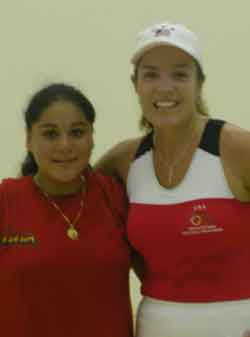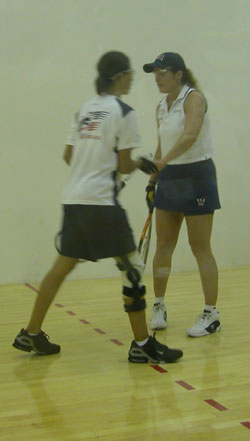
September - October 2003
Vol. 14, No. 5 | Contents
A Pan Am First!
Site coverage & photos by USOC Press Officer Ryan John; added photos by press officer Sara Greenlee
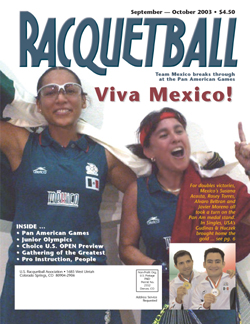
|
In the third playing of a Pan American Games racquetball event, 2003 marked the first time that the U.S. did not sweep gold in every division. It was also the first year that someone other than an American or a Canadian reached the final of any division at what has become the sport’s most prestigious international competition. And although the U.S. may have walked away from Santo Domingo disappointed, it is hard to view two gold, three silver, and a bronze medal as sub par. It just goes to show that the world is catching up with the U.S. on the hardwood. |
With only a handful of exceptions, the U.S. women’s doubles teams have historically been considered a lock for bringing home a gold in international competition. Since teaming up for the 2002 World Championships, Jackie Rice and Kim Russell hadn’t lost a game, let alone a match. Even with other talented doubles teams on the rise, none had even come close to challenging the pair. But what was supposed to be a routine walk-through for Rice and Russell took a downturn at the Pan Am final, when faced by the lefty-righty Mexican pair of Susana Acosta and
Rosy Torres.
Things had seemed to be rolling along for the reigning World Champs. As expected, they had come through their pool without losing a game and handily defeated Bolivia’s Paola Nunez and Carola Santos in the semifinal of the medal round, 15-8, 15-3.
At the same time, Acosta and Torres also seemed to be cruising comfortably, advancing undefeated in their pool, then winning back to back medal round playoffs to get to the final. First they dispatched Colombians Maria Gomez and Claudia Ramirez, 15-1, 15-2, then defeated Josee Grand’Maitre and Julie
Nuebauer of Canada, 15-13, 15-1 in the semifinal.
 |
| Rosy Torres dodges a shot that partner Suzy Acosta is ready to pick up with her backhand. They’re flanked by Russell (left) and Rice. Photo courtesy Federacion Mexicana de Raquetbol. Fotografías © 2003 Deporte.gob.mx and www.fmr.org.mx. Click on photo to enlarge. |
In their final against the U.S., Acosta and Torres pressed from the outset, opening the first game with aggressive play that kept the match tight. The momentum went back and forth, with each team siding out repeatedly until tying it up at 6-6. Then, predictably, Rice and Russell found their groove and pulled away to win the first game, 15-8.
But the second game took on a different tone as Acosta and Torres brought renewed energy, and jumped out to a 7-0 lead. The U.S. nearly caught up at 8-7, but that was as close as they would get. Mexico ran off the last seven points of the game to force a tiebreaker, the first that Rice and Russell had ever experienced together.
The U.S. didn’t seem fazed as they went into the deciding third. Sure, it was the first breaker that they had faced together, but far from the first that either veteran had seen.
As play began, Mexican fans thundered celebration in the stands, but it was quickly quieted when the U.S. took a 4-1 lead, which then stretched to 7-3.
That was when Mexican spectators launched a resurgence of support, and Acosta and Torres followed suit. They rolled off five straight points to take their first lead of the game at 8-7. Rice and Russell seemed a little surprised after the run, but settled back into the service box to score two straight points and gain a slight advantage.
Acosta and Torres then reclaimed the service box, much to the delight of fans who could sense that something special was about to happen. And they weren’t disappointed as Acosta and Torres closed out the match with a three point run to secure one of the biggest upsets in recent history, with a remarkable 11-9 victory.
Repeat Performance
From the outset, the men’s doubles draw had seemed to be the most even playing field at the Pan Ams. As expected, the teams of top-seeded Ruben Gonzalez and Mike Guidry for the U.S. and Alvaro Beltran and Javier Moreno for Mexico were stand-outs, but many other talented teams in the draw were also in the hunt.
Coming out of preliminary rounds, Gonzalez and Guidry, Beltran and Moreno, and Canadians Cory Osborne and Francois Viens all won their respective pools. But Gonzalez and Guidry had gone to tiebreakers before advancing, after slow starts saw them drop their first game in each of their early matches.
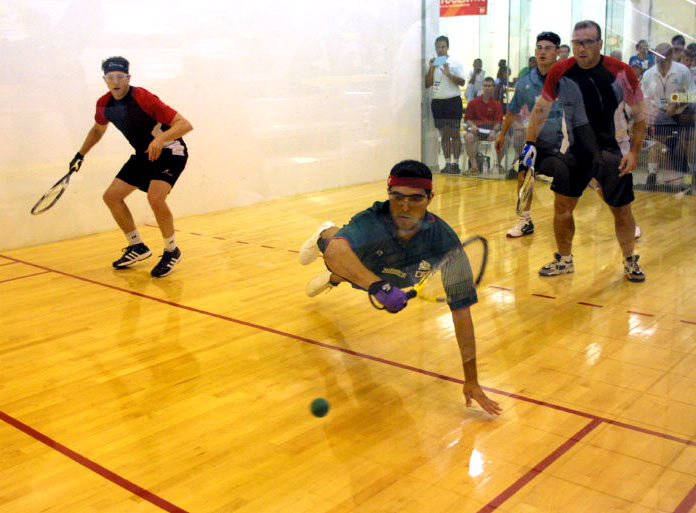 |
| Alvaro Beltran leaps for a shot, while teammate Javier Moreno covers back court in their semifinal. They are flanked by Canada’s Francois Viens (left) and Cory Osborne. Photo courtesy Federacion Mexicana de Raquetbol. Fotografías © 2003 Deporte.gob.mx and www.fmr.org.mx. Click on photo to enlarge. |
Heading into the medal rounds at the close of the week, the Mexican team seemed to be the hottest. They had outscored their opponents 60-16 during the pool play and continued on that tear in the main draw. They got past the tough Colombian team of Francisco and Juan Gomez, 15-4, 15-8 in the quarterfinals, then ousted the Canadians in the semifinals 15-3, 15-9, to move into the gold medal contest.
While the Mexicans looked like the team to beat, the U.S. stepped up their game when the medal rounds began, defeating the Chilean team of Pablo Fajre and Sebastian Roesller 15-7, 15-9. They then defeated pesky young Argentineans Daniel Maggi and Shai Manzuri, 15-14, 15-8.
With that, the finals were set as a rematch of the 2003 Tournament of the Americas, in which the U.S. had pulled out an 11-10 win over Mexico. Gonzalez and Guidry knew they couldn’t rest on that April win and had to be prepared for an equal, or better, challenge from Beltran and Moreno.
“We won 11-10 at the Tournament of the Americas, but that was five months ago,” Gonzalez said before the match. “This is now. A new gold medal. A new ball game. This is the Pan Ams.”
Although there had been plenty of signs, no one expected Beltran and Moreno to come out like they did in the finals. They chalked up ten points before the U.S. could even get on the board. Gonzalez and Guidry cut the lead in half at 10-5, before Beltran and Moreno once again moved ahead, eventually winning the first game 15-9.
The second game was even more punishing, as Mexico racked up a blistering 14-0 lead. To their credit, Gonzalez and Guidry never gave up, and rallied to score seven straight points on an exceptional run, but it was too little, too late. Beltran and Moreno continued the celebration begun earlier by their female teammates, with a 15-7 win to take the gold medal in straight games.
“We couldn’t get anything going. They played great,” a disappointed Guidry said after the match. “We got into the (service) box, but couldn’t score any
points."
[ top ]
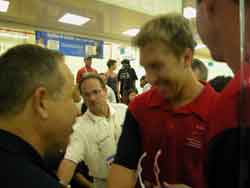 After advancing through pool play, which Jack Huczek called “a good warm-up for the main draw,” the seeds were set for the medal rounds. The winners of each of the three round-robin pools earned the top three seeds in the draw. Canada’s Mike Green (No.1), Brian Istace (No.3), and Jack Huczek (USA, No.2), each won their respective pools and thus earned their spots in the draw. USA’s Rocky Carson lost a close match with Green in their pool, which dropped him into the No.6 spot and in the same half of the draw as teammate Huczek.
After advancing through pool play, which Jack Huczek called “a good warm-up for the main draw,” the seeds were set for the medal rounds. The winners of each of the three round-robin pools earned the top three seeds in the draw. Canada’s Mike Green (No.1), Brian Istace (No.3), and Jack Huczek (USA, No.2), each won their respective pools and thus earned their spots in the draw. USA’s Rocky Carson lost a close match with Green in their pool, which dropped him into the No.6 spot and in the same half of the draw as teammate Huczek.The quarterfinals saw Green advance past current 16- world junior champ Augustin Tristan of Mexico, 15-5, 15-6, while Huczek cruised past Colombia’s Francisco Gomez, 15-2, 15-1. Current world doubles champion Gilberto Mejia of Mexico played singles at this event and defeated Bolivia’s Jorge Sambrana, 15-4, 15-2, for the chance to meet Green in the semifinals. Carson faced Istace in a match that started out close until Carson took control to win, 15-12, 15-7, and set up the all-U.S. semifinal.
“Luckily Brian wasn’t on top of his game,” Carson said after the match. “I’ve played [him] when he’s playing good and this wasn’t one of those times.”
In the top half Green and Mejia battled it out against a backdrop of vocal crowd support from both the Canadians and the Mexicans in the stands. Green was able to edge Mejia in two games that could have gone either way, 15-13, 15-14.
As soon as that match was over, all the attention, and the crowd, shifted to the rematch of the 2003 U.S. National Singles final between Carson and Huczek, which was already in progress, but far from over.
Carson won the first game by taking an early 8-0 lead and then hanging on to win 15-11. The second game was much closer, with Huczek earning the last three points of the game to win 15-12.
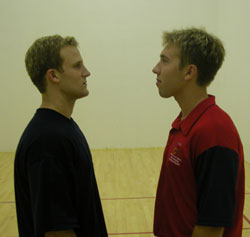 After agitating each other in the first two games, situations got even more tense in the third. Carson earned the first point, followed by a sideout and a point for Huczek, to even the score at 1-1. But Huczek was convinced that he had earned two points, despite the referee’s scorecard, the scoreboard, and the linesman’s scorecard all indicating only a single point earned. Huczek appealed, lost the challenge, and then lost control. He tossed his towel into the referee’s face, was issued a technical, and ended up losing the single point he’d gotten so far.
After agitating each other in the first two games, situations got even more tense in the third. Carson earned the first point, followed by a sideout and a point for Huczek, to even the score at 1-1. But Huczek was convinced that he had earned two points, despite the referee’s scorecard, the scoreboard, and the linesman’s scorecard all indicating only a single point earned. Huczek appealed, lost the challenge, and then lost control. He tossed his towel into the referee’s face, was issued a technical, and ended up losing the single point he’d gotten so far.
Huczek quickly shook off the incident and rattled off seven straight points to take a 7-1 lead. He then built it to 10-3 despite the crowd leaning heavily in Carson’s favor after the outburst. Carson managed to score three more and treated the crowd to a little dance before Huczek closed the door 11-6.
When asked how he managed to shut out the technical and the crowd to focus on the win, Huczek offered, “I have been used to them my whole career; the non-calls, the bad calls. I’ve been used to them my whole life and I am not going to let them affect me now.”
Carson had a different outlook, “I didn’t play consistent and he played tough,” he said. “It was an honor to play for my country in front of all the Dominican fans and all of the racquetball fans. I just tried to leave it all on the line today.”
In the following Huczek vs. Green final, it was apparent that Huczek had left his frustration behind. He looked sharper and more confident as he methodically went about winning the match in straight games 15-12, 15-7.
“I felt more relaxed today. I don’t know why,” he said. “I felt good all morning and in my warm-up. I was in a zone and felt very comfortable.”
“Mike played well, but missed some shots that gave me opportunities,” he continued. “I played consistent and that’s all you have to do.”
[ top ]
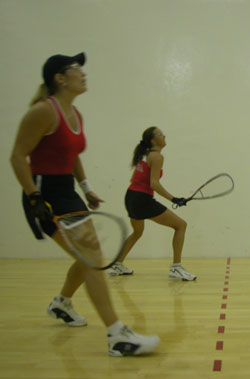 From the start, it had appeared to be a two-woman race between top USA women Cheryl Gudinas
and Laura Fenton. That turned out to be the case, when the two met in the women’s singles final, but there were a series of interesting happenings along the way.
From the start, it had appeared to be a two-woman race between top USA women Cheryl Gudinas
and Laura Fenton. That turned out to be the case, when the two met in the women’s singles final, but there were a series of interesting happenings along the way.Early on, Fenton had been placed into what was considered the toughest prelim pool, but quickly turned it around to be a positive instead of a negative. “We definitely have the toughest pool, but sometimes that works to your advantage,” she explained. “Sometimes when your pool isn’t as tough and you come up against a better player in the (single elimination) draw, you may not be ready.”
Fenton went on to win her round-robin, as did Gudinas and Canada’s Lori Jane Powell, positioning Gudinas in the No.1 spot, Powell No.2, and Fenton No.3. Chile’s Angela Grisar, who won a bronze medal in women’s doubles at the 1995 Pan Am games, secured the No.4 spot after finishing second to Fenton in their flight.
Moving into medal round play, the quarterfinals had some intriguing match-ups. The Dominican Republic’s Claudine Garcia was one of the faster rising players on the LPRA tour before a knee injury. Now in her comeback, she faced Gudinas who wasted no time in dispatching the local star, 15-4, 15-5.
Angela Grisar faced Mexico’s Nancy Enriquez, the 2002 16- world junior runner-up and a sure bet to become a force in the future. Grisar had no trouble dispatching the youngster in this faceoff, 15-6, 15-5, but it may not be so easy next time.
Another young player with promise, Bolivia’s Carola Loma, had to face Laura Fenton, who, since turning 40, has been playing some of the best racquetball of her life. Loma kept her nerves a little better than when she faced Gudinas in the pool, but it was still Fenton who walked away with the straight game win 15-7, 15-6.
Due to the preliminary round seedings, Powell and fellow Canadian Jennifer Saunders had the misfortune of facing each other very early in the draw. But what was bad luck for them was good luck for the spectators, who were treated to an exceptional match. Powell narrowly won the first game 15-14, then Saunders came back to squeak by with the same score in the second. Powell then surprised everyone by running away with the tiebreaker, 11-1.
In the semifinals Gudinas blew past Grisar in straight games of 15-5, 15-2, looking unstoppable in the process. Fenton had some trouble with Powell (who showed no signs of fatigue), but still managed the win, 15-10, 15-14.
Fenton and Gudinas have been the two most successful females in U.S. team singles competition in recent years. Fenton won the last two Tournament of the Americas events, including the one held this past April in Santo Domingo. Defending her Pan Am title, Gudinas has won just about everything else, including five straight USRA National Singles Championships and the past two world singles crowns.
Fenton scored the first five points of the match like a woman on a mission. Gudinas brought it even at 8-8, but seemed to be out of sorts, leaving the ball up and giving Fenton too many opportunities to put the ball away. Fenton pulled away again, this time never looking back, to take the first game 15-11.
The second game was a seesaw battle to 7-7, when Gudinas began to grind out her points, while keeping Fenton at bay. After three sideouts, Gudinas notched two points to go up 9-7. After eight more sideouts with no score, Gudinas tacked on another. Finally after four more sideouts she ended the game, 15-7, with a five-point run to force the tiebreaker.
The tiebreaker was played almost exactly as the second game had been, with both players staying close until it was tied at 5-5. Numerous sideouts followed until Gudinas once again tacked on a point here and there, until she came away with an 11-5 win for her second straight gold medal.
“It’s more of a relief to have accomplished what I’ve wanted to do,” she said after the match. “Of course I’m happy. I’ve wanted this for four years. It’s been my goal.”
by Cheryl Gudinas
[ top ]
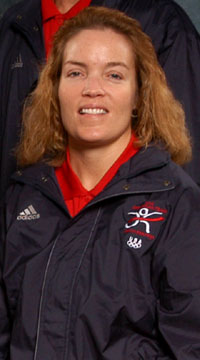 Wednesday,
July 30 — Traveling. Two weeks seems like a long time. I am eager to
get this going. But as with every international event, it is hard to get
the nervousness I need to play well this many days before competition
begins. As is tradition, I am filled with self doubt, but reassure myself
that, when the time comes, I will be ready. My main concern: How will we
all function with 11 individuals in one apartment/suite? I worry that, as
a restless sleeper, this will be an issue. I know I need to begin to
prepare mentally for this; perhaps one of the perceived obstacles enroute
to the gold.
Wednesday,
July 30 — Traveling. Two weeks seems like a long time. I am eager to
get this going. But as with every international event, it is hard to get
the nervousness I need to play well this many days before competition
begins. As is tradition, I am filled with self doubt, but reassure myself
that, when the time comes, I will be ready. My main concern: How will we
all function with 11 individuals in one apartment/suite? I worry that, as
a restless sleeper, this will be an issue. I know I need to begin to
prepare mentally for this; perhaps one of the perceived obstacles enroute
to the gold.
Thursday, July 31 — Still Traveling. Team briefing video makes me remember that getting here has been my goal since '99. Just when I think I am really fit, being around other USA athletes makes me realize there is so much room for improvement.
In Tampa's airport, Ruben steals the passport of an athlete from another sport. Typical Ruben. He delays departure a good 30 minutes, but it is good for a laugh.
The apartment suite is better than anticipated. Time to settle in and establish my space and living quarters, which will allow me to begin to get in my routine.
Friday, August 1 — First Day of Practice and Opening Ceremonies. We see the club for the first time and the courts are great. It's a very nice facility. As we walk toward the stadium to march in as Team USA, it is difficult to fight back tears, remembering all the hard work it has taken to get here and how important it is to be here.
The Weekend, August 2-3 — Second & Third Practice Days. It is hard to stay on my routine here, so long before competition. Practices go as usual. It’s an uncomfortable feeling, always playing tentatively against my teammates. It always makes me wonder, "Is this how I will play once we start?" I am content knowing this is a common feeling with every trip and am confident and hopeful I will be ready when the time comes.
Monday, August 4 — Last Practice Day. Team USA is settling into their corners of the apartment. It begins to feel livable, though not ideal. I need my space and solitude, and am determined to find ways to get it.
Tuesday, August 5 — Competition Begins. In a way, it is nice to begin after being here almost a week. It is time to determine my fate. Beginning to feel the nervousness, and I am a little envious of the comfort found in being part of an actual team - like volleyball or B-Ball. But in reality, there is so much to be said for having only oneself to hold accountable or hopefully to credit, and having the courage to do this on my own. I wouldn't have it any other way, singles competition, for me, is where it's at.
The Round Robin's don't necessarily go as predicted. I am certain the main draw will be full of surprises. There is no use thinking ahead. I have to attempt to do the things I need to do to play well. I can't worry about who or what will come next.
|
|
|
|
Wednesday, August 6 — Second Day of Round-Robin. I play Lupita Torres from Mexico. I win the first game, 15-5 and go up 10-4 in the second. The next thing I know it is 10-8, although I ultimately win 15-9, I am displeased with Lupita's run of four points. I know I won't be able to allow runs like that in the medal rounds. Hopefully, this will sharpen me for tomorrow.
Thursday, August 7 — Third Day of Round Robin. I am nervous about my match with youngster Carola Loma of Bolivia. She took care of Lupita easily when they played. I know this little girl is going to be good. She's a server, a getter, a shooter. I start strong. The nervous energy helps me. I beat Carola 15-1, 15-1.
She never gets going, but she is nervous to play me and our scores are no indications of how great she will become. I like the way I am feeling on the court, but have a feeling I will draw Claudine Garcia in the quarter of the medal rounds. I find out this is indeed true. I am certain I will have to bring my best game to beat her, as she will have her hometown crowd behind her.
Friday, August 8 — Day One of Medal Round. Claudine and I have played numerous times. I never remember my record against her, only the potential she has to beat anyone here. She is a fair player and a good shooter. I feel a mix of quiet confidence and dread. The dread is normal, but I am eager to see what I can do.
The match goes more smoothly than anticipated, 15-4, 15-6. It is enjoyable to silence any Chicago critics that doubted my chances with Claudine.
Saturday, August 9 — Day Two of Medal Round. My match with Angela Grisar of Chile; Angela has had the best event of anyone as an underdog, so far. I respect her game. I am nervous, especially since many U.S. Team members began feeling ill last night. I slept restlessly with a sore throat and congestion. Surprisingly, this hampers my play in no way whatsoever. Right until 5-5, I runoff 24 straight, looking at a 14-0 lead in game two. It is a relief to have this over with, but I know I will have to get rest tonight to do this all again tomorrow.
My reward for winning today: having to feel nauseous and painfully nervous for one more day. But this is the way it is at every event, and I guess this is what it is all about: Having the courage time and time again to put myself out there-- win or lose, with no excuses.
Sunday, August 10 — Gold Medal Match. I wake up hoping I will feel nauseous. That is always a good sign for me. If I am not nervous, then I really start to worry. I make myself go through my rituals. Sometimes it is not easy. Many days I wish to get back under the covers and sleep away the stress, see a movie and have an unhealthy dinner; anything but wonder what my fate will be. Again there is a mix of excitement and dread.
I wake up after tossing and turning all night. As I tremble, I remind myself this is a good sign for me. I force myself to go through my routine, which does not come easily. This is a bad sign. I have no feel for how things will go. I have a mix of thoughts on a day when I need to quiet my mind.
The countdown begins: 25 minutes to the start. What will my day hold? I pray I will do well. But my start is less than stellar. I am a completely different person than all week. I know this will be a mental struggle. Fortunately, this is my strength.
I cannot silence my mind. I justify a potential loss. Would a loss here ruin my year? No. Yes! A few things occur that urge me on to "chip away." Somehow, through one of my less pretty performances I manage to win game two, and the tiebreaker 11-5. I feel comfortable infrequently throughout. But it doesn't matter to me if it was a beautiful match for the fans. It is a mission accomplished, a goal of four years captured. Mostly I am relieved and overjoyed to silence any critics I have.
Top | RacquetballMagazine.com | USRA.org
© United States Racquetball Association -- All Rights Reserved
